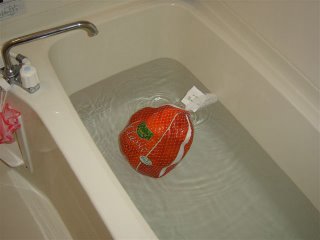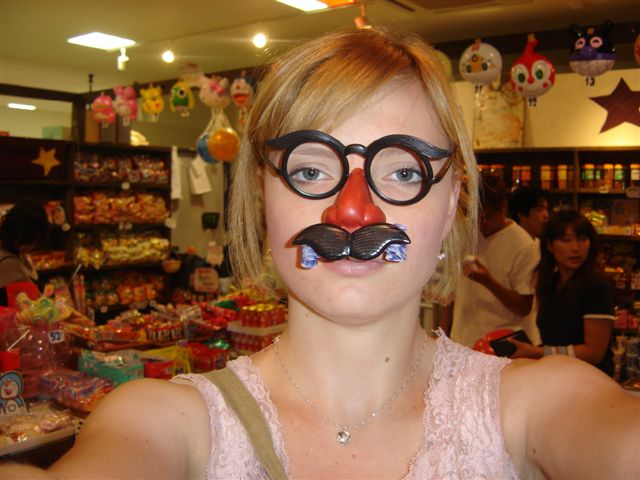Here's an article that is in the latest issue of Newsweek by an American woman named Cathy Gandel. While I am barely only 5 foot 8, I understand much of what this woman is talking about...I am without a doubt American size :).
Dec. 12, 2005 issue - I tiptoed into the small inner sanctum of the women's ofuro (communal bath) at the small ryokan (inn) in the Japan Alps. Following custom, I had left my clothes in the outer dressing room, bringing only a small towel with me. The steam rising from the square wooden tub obscured the small window, hiding the tiny garden outside.
Unfortunately, the steam did not hide me, a tall, fair-haired, light-skinned foreign woman. As I sat on the little plastic stool and turned on the wall tap to start the prewash cycle, I became aware of sidelong looks, gasps, muted giggles and a sudden exodus of the Japanese women and children. I must have resembled a gorilla in the mist, or the repulsive creature that was Sigourney Weaver's nemesis in another of her movies. After all, that's what I was to these women: an alien, a gaijin.
Japan's homogeneity has been well documented. The saying "The nail that stands out gets hammered down" describes not only the Japanese loyalty to the group, but also the penalty for not blending in. Because I was a foreign woman, I stood out; the fact that I am 5 feet 10 made it worse. A group photo from my sayonara party says it all: a straight line of my Japanese women friends and me—the unhammered nail standing out from all the rest.
Although I was never really comfortable with being tall there, I had to learn to deal with it. After all, Tokyo is a large city with a large population squeezed into a very small place. It's not surprising that Japan excels at making mini cars, coffeepots, washer-dryers and food processors. But I am definitely not mini, and I simply took up too much space in Japan.
Yes, I was a gaijin giant, and my height provided more than one awkward moment. I hit my head on the overhanging subway straps. I often had to stoop to enter doorways or look into mirrors positioned for shorter people. Sitting at the low tables in coffee shops, I was unable to cross my legs without knocking over the water glasses (small) and the coffee cups (demi). More than once I slipped slowly into the small, deep ofuro only to create a large tidal wave that flooded the white tile floor, overturning the wooden stools, green soap dishes and pink buckets in a scene reminiscent of "The Sorcerer's Apprentice."
Unfortunately, the steam did not hide me, a tall, fair-haired, light-skinned foreign woman. As I sat on the little plastic stool and turned on the wall tap to start the prewash cycle, I became aware of sidelong looks, gasps, muted giggles and a sudden exodus of the Japanese women and children. I must have resembled a gorilla in the mist, or the repulsive creature that was Sigourney Weaver's nemesis in another of her movies. After all, that's what I was to these women: an alien, a gaijin.
Japan's homogeneity has been well documented. The saying "The nail that stands out gets hammered down" describes not only the Japanese loyalty to the group, but also the penalty for not blending in. Because I was a foreign woman, I stood out; the fact that I am 5 feet 10 made it worse. A group photo from my sayonara party says it all: a straight line of my Japanese women friends and me—the unhammered nail standing out from all the rest.
Although I was never really comfortable with being tall there, I had to learn to deal with it. After all, Tokyo is a large city with a large population squeezed into a very small place. It's not surprising that Japan excels at making mini cars, coffeepots, washer-dryers and food processors. But I am definitely not mini, and I simply took up too much space in Japan.
Yes, I was a gaijin giant, and my height provided more than one awkward moment. I hit my head on the overhanging subway straps. I often had to stoop to enter doorways or look into mirrors positioned for shorter people. Sitting at the low tables in coffee shops, I was unable to cross my legs without knocking over the water glasses (small) and the coffee cups (demi). More than once I slipped slowly into the small, deep ofuro only to create a large tidal wave that flooded the white tile floor, overturning the wooden stools, green soap dishes and pink buckets in a scene reminiscent of "The Sorcerer's Apprentice."
When we left New York, I was a working mom dressed in power suits, having business lunches, serving on the board of directors of my kids' school. When we arrived in Japan, everything I was, or thought I was, crumpled before one undeniable defining characteristic: I was different.
I learned some of the frustrations that accompany being different. For example, I studied the language for the five years I lived in Tokyo and mastered "survival Japanese"—meaning I could shop, travel, make a reservation and order in a restaurant. My Japanese was good enough for me to understand when men would mutter to each other, "Se ga takai, ne!" or, "She's really tall!" During our stay, I listened to lots of fractured English, sometimes from strangers who came up to me on the subway wanting to practice. On the other hand, many times I spoke in what I knew to be passable Japanese to a clerk or conductor, only to be rewarded with a vacant stare and a long, drawn-out "Huhhhh?" The person to whom I was speaking couldn't believe that Japanese words were coming from a foreign face.
In Japanese, the word for different, chigau, is also the word for wrong. I felt all wrong in Japan, but I did my best to fit in. I learned the art of gift-giving and never arrived anywhere empty-handed. I learned not to eat on the street, not even ice cream, because "only beggars need to eat while walking." I learned to look for beauty in details, not broad vistas: three or four ripe, orange persimmons against a gray stone wall. I learned to listen even when I could not understand.
It wasn't until my husband's assignment ended and we were transferred to Los Angeles that I realized how physically and emotionally constraining Tokyo had been for me. While being tall and foreign and a woman are not serious handicaps, my experience in Japan gave me the chance to walk the proverbial mile in another's shoes. I know what it's like to be stared at in the subway or laughed at in a sushi bar or ignored because my syntax isn't perfect. Now that I do, I am much more ready to accept others who may be different—but not necessarily wrong.
 This is Amanda, a university student from Texas who came and worked with me for one week.
This is Amanda, a university student from Texas who came and worked with me for one week.
 While Amanda was here, we went Christmas Caroling in downtown Osaka. We handed out Christmas CDs. Thankfully it wasn't too cold that night, but we still had to bundle up.
While Amanda was here, we went Christmas Caroling in downtown Osaka. We handed out Christmas CDs. Thankfully it wasn't too cold that night, but we still had to bundle up.
 This is at Outback Steakhouse. My friend, Maya, had a surprise party and we ate sooo much food.
This is at Outback Steakhouse. My friend, Maya, had a surprise party and we ate sooo much food.
 During Amanda's week with me, we were invited to speak at a high school about American culture.
During Amanda's week with me, we were invited to speak at a high school about American culture.
 And we went to Himeji Castle. I thought that since it was a castle that it would be all pretty inside and that royalty at one time had lived inside. But really, castles in Japan are just fancy forts. The castles were just used to store food, hang guns and armor, and watch for the enemy coming. I don't know why they call it a castle.
I am so thankful Amanda was able to come to Japan and spend a week working and living with me. We had a busy week with Christmas Caroling, having a Christmas Party at my house, prayer walking, going to parties and dinners with Japanese, speaking at a high school, attending English Club meetings, climbing Himeji, and meeting with new Christians. Thanks for coming to Osaka, Amanda!!
And we went to Himeji Castle. I thought that since it was a castle that it would be all pretty inside and that royalty at one time had lived inside. But really, castles in Japan are just fancy forts. The castles were just used to store food, hang guns and armor, and watch for the enemy coming. I don't know why they call it a castle.
I am so thankful Amanda was able to come to Japan and spend a week working and living with me. We had a busy week with Christmas Caroling, having a Christmas Party at my house, prayer walking, going to parties and dinners with Japanese, speaking at a high school, attending English Club meetings, climbing Himeji, and meeting with new Christians. Thanks for coming to Osaka, Amanda!!






